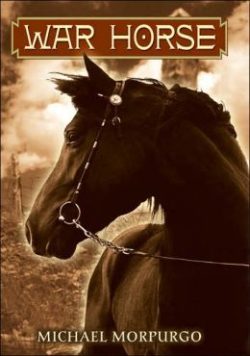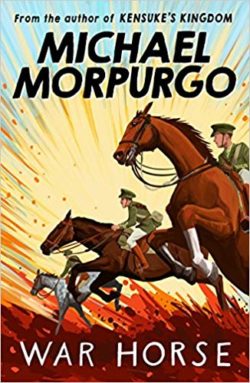 by Michael Morpurgo
by Michael Morpurgo
Conditional Recommendation: The story of the First World War as told from the perspective of a farm horse turned cavalry horse.
Genre: Historical, Animal
This is a good, good story. Why is it good? Because it upholds goodness, kindness, honor, and the value of life and lives lost. Michael Morpurgo said about this story, “I had written one or two books already, but now for the first time I came across a subject that I cared about deeply, one that I felt I could write from the heart.” And that’s exactly what comes across to the reader—a story full of heart.
It is 1914, and Joey, a farm horse, is sold to the army and thrust into the midst of World War I on the Western Front. When Joey is dragged away, his heart aches for Albert, the farmer’s son he is forced to leave behind. In the army the beautiful red-bay horse is trained to charge the enemy, drag heavy artillery, and carry wounded soldiers not much older than Albert off the battlefields. Amongst the clamoring of guns, and while plodding through the cold mud, Joey wonders if the war will ever end. And if it does, will he ever find Albert again?
There are a few things parents should be aware of before giving this book to their kids or reading it together:
- Albert’s father is a mean drunk. He’s a decent man when he’s not drinking but he’s made it a habit and Albert’s mother has to mediate between the two of them at times.
- There’s the violence of guns, shells, and barbed wire; there are injuries, deaths and sickness. Nothing is described in gory detail, but the reality is given.
- The various characters Joey comes in contact with make a wide range of comments about God and a lot of them are false. Everything from “God helps those who help themselves,” and “God doesn’t know what’s going on in this war,” to “And now I’ve just asked God, ‘cause when all’s said and done, it’s all up to Him.”
- There’s an ideology today that says an animal’s life is worth more than a human’s life. The following quote adheres to this ideology: “But I remember you telling us when we first came here that a horse’s life is maybe even more important than a man’s, ‘cause a horse hasn’t got no evil in him except any that’s put there by men.” And while it’s true that animals aren’t evil (though they are affected by the sin curse (Genesis 3)), it is absolutely false that an animal’s life is more valuable than a human’s. This is so because humans were made in the image of God—animals were not. Animals were given into the care of man; man was given the responsibility to rule over them.
The loyal, strengthening bond of friendship is the dominant theme of this book. Joey forges a deep connection with Albert while they grow up together on the farm; when he joins the cavalry he develops a bond with another horse named Topthorn and they lend each other strength and courage through the many seasons of wartime. Along the way, Joey makes many friends who give him companionship and care—Captain Nicholls (English), Friedrich (German), Emilie and her grandfather (French), and countless soldiers, doctors and nurses from every side of the war.
Another major theme of this book is valuing human life and on the other side of that coin comes an anti-war message. From a horse’s point of view, there aren’t sides or strategies or politics, there’s just men and horses losing their lives. This book does not sugarcoat the devastation of war and the great damage it does to human and animal lives.
There are many heart-warming scenes, instances of kindness and compassion sprinkled throughout this book that I found myself tearing up frequently. Kindness shines all the brighter against the backdrop of wartime.
Without fail throughout this story life is respected, life is honored, loss of life is mourned. Death, though it comes about by awful means, is always treated with appropriate severity.
There’s this absolutely wonderful line that encapsulates the whole story: “We must never give up…’cause where there’s life there’s still hope.” Truth! Amen!
This story is well written. It’s easy to read but rich in description and meaning.
The entire book is told through the point of view of the horse, Joey. His perspective is non-judgmental and matt-of-fact, which works well and makes for a lighter portrayal of the heavy realities of war. Joey is good natured and easy going—a rather pleasant character to experience the story with.
Albert, Albert’s father, Zoey, Captain Nicholls, Topthorn, Trooper Warren, Emilie & her grandfather, Friedrich, David, Major Martin, Sergeant Thunder—as you can see there are many characters that weave in and out of Joey’s story and each of them feels like someone who once lived in the world rather than just in the mind of the writer. All these characters are worth knowing.
The plot keeps the reader engaged all the way through—this story is enjoyable from beginning to end whether we’re on the farm or in the war.
The story of a horse’s experience of WWI is moving, inspiring, heart-wrenching, and uplifting. This would be a great book to read aloud.
The ending is happy and the perfect blend of suspense, resolution, gravity and lightheartedness. The reader will be satisfied by the end of this book if not sooner. Please read, please enjoy!

